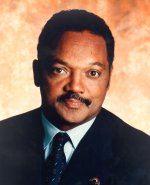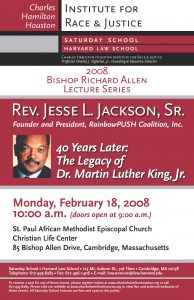2008 Bishop Richard Allen Lecture Series
The Reverend Jesse Louis Jackson, Sr., Founder and President of the Rainbow/PUSH Coalition, is one of America’s foremost civil rights, religious and political figures. Over the past forty years he has played a pivotal role in virtually every movement for empowerment, peace, civil rights, gender equality, and economic and social justice.
Reverend Jackson has been called the “Conscience of the Nation” and “the Great Unifier,” challenging America to be inclusive and to establish just and human priorities for the benefit of all. He is known for bringing people together in common ground across lines of race, culture, class, gender and belief.
Born on October 8, 1941, in Greenville, South Carolina, Jesse Jackson graduated from the public schools in Greenville, then enrolled in the University of Illinois on a football scholarship. He later transferred to North Carolina A&T State University, and graduated in 1964. He began his theological studies at the Chicago Theological Seminary, but deferred his studies when he began working full-time in the Civil Rights Movement. Reverend Jackson received his earned Master of Divinity Degree in 2000.
Reverend Jesse Jackson began his activism as a student in the summer of 1960 seeking to desegregate the local public library in Greenville, and then as a leader in the sit-in movement. In 1965 he became a full-time organizer for the Southern Christian Leadership Conference (SCLC). He was soon appointed by Dr. Martin Luther King Jr. to direct SCLC’s Operation Breadbasket program. In December of 1971, Reverend Jackson founded Operation PUSH (People United to Serve Humanity) in Chicago, IL. The goals of Operation PUSH were economic empowerment and expanding educational, business and employment opportunities for the disadvantaged and people of color. In 1984, Reverend Jackson founded the National Rainbow Coalition, a national social justice organization, based in Washington, D.C, devoted to political empowerment, education and changing public policy. In September of 1996, the Rainbow Coalition and Operation PUSH merged in the Rainbow/PUSH Coalition to continue the work of both approaches and to maximize resources. Long before national health care, a war on drugs, direct peace negotiations between Palestinians and Israelis, ending apartheid in South Africa and advancing democracy in Haiti became accepted public policy positions, Reverend Jesse Jackson advocated them. Reverend Jackson’s advocacy on these and other issues helped bring the American public to a new level of consciousness. Reverend Jackson’s two presidential campaigns broke new ground in U.S. politics. His 1984 campaign registered over one million new voters, won 3.5 million votes, and helped the Democratic Party regain control of the Senate in 1986. His 1988, campaign registered over two million new voters, won seven million votes, and helped boost hundreds of state and local elected officials into office. Additionally, this civil rights leader won an historic victory, coming in first or second in 46 out of 54 primary contests. His clear progressive agenda and his ability to build an unprecedented coalition inspired millions to join the political process.
Though Reverend Jesse Jackson has not run for national political office since 1988, he has continued to promote voter registration and lead get-out-the-vote campaigns, believing that everyone should be encouraged to be a responsible, informed and active voter. He has spearheaded major organizing tours through Appalachia, Mississippi, California and Georgia. He has continued to be a leading advocate for a variety of public policy issues, including universal health care, equal administration of justice in all communities, sufficient funding for enforcement of civil rights laws, and for increased attention to business investment in under-served domestic communities (a theme that the Clinton administration picked up as the “New Markets Initiative”). Reverend Jackson also supports a broad range of policies to improve education, eliminate poverty, and remind everyone that we are a “One-Big-Tent-America,” with room for all, and none left in the margins. As a highly respected and trusted world leader, Reverend Jackson has acted many times as an international diplomat in sensitive situations. For example, in 1984 Reverend Jackson secured the release of captured Navy Lieutenant Robert Goodman from Syria, and the release of 48 Cuban and Cuban-American prisoners in Cuba. He was the first American to bring hostages out of Kuwait and Iraq in 1990. In 1999 Reverend Jackson negotiated the release of U.S. soldiers held hostage in Kosovo. He has traveled extensively in the Middle East and Asia, and was a special guest of President Fernando Cardoso of Brazil in honoring Zumbi, the leader of slave revolts that led to the end of slavery in Brazil.
A hallmark of Reverend Jackson’s work has been his commitment to youth. He has visited thousands of high schools, colleges, universities and correctional facilities encouraging excellence, inspiring hope and challenging young people to study diligently and stay drug-free.
Reverend Jackson has also been a consistent and vigorous supporter of the labor movement in the U.S. and around the world. Reverend Jackson is known as someone who has walked more picket lines and spoken at more labor rallies than any other national leader. He has worked with unions to organize workers, to protect workers’ rights, and to mediate labor disputes. In 1996, he traveled to Asia to investigate treatment of workers in the Japanese automobile industry and in athletic apparel factories in Indonesia.
A renowned orator and activist, Reverend Jackson has received numerous honors for his work in human and civil rights and for nonviolent social change. In 1991, the U.S. Post Office put his likeness on a pictorial postal cancellation, only the second living person to receive such an honor. He has been on the Gallup List of the Ten Most Respected Americans for more than a dozen years. He has received the prestigious NAACP Spingarn Award, in addition to honors from hundreds of grassroots, civic and community organizations from coast to coast. Reverend Jackson has received more than 40 honorary doctorate degrees, and frequently lectures at major colleges and universities including Howard, Yale, Princeton, Morehouse, Harvard, Columbia, Stanford and Hampton. The most prestigious honor yet came on August 9, 2000, when President Bill Clinton awarded Reverend Jackson and other distinguished notables the Presidential Medal of Freedom, the nation’s highest civilian honor. The Presidential Medal typifies a life of service and a concern for the least fortunate.
From 1992 to 2000, Reverend Jackson hosted “Both Sides With Jesse Jackson” on CNN (Cable News Network). He continues to write a weekly column of analysis which is syndicated by the Chicago Tribune/Los Angles Times. He is the author of two books: Keep Hope Alive (South End Press, 1989), and Straight From the Heart (Fortress Press, 1987). In 1996, Reverend Jackson co-authored the books Legal Lynching: Racism, Injustice, and the Death Penalty (Marlowe & Company, 1996) and It’s About The Money (Random House, 1999) with his son, U.S. Representative Jesse L. Jackson, Jr.
In October 1997, Reverend Jackson was appointed by President Bill Clinton and Secretary of State Madeleine Albright as “Special Envoy of the President and Secretary of State for the Promotion of Democracy in Africa.” In this official position Reverend Jackson traveled to several countries on the African continent and met with such national leaders as, President Nelson Mandela of the Republic of South Africa, His Excellency Daniel T. Arap Moi of Kenya, and President Frederick J.T. Chiluba of Zambia.
Reverend Jackson married his college sweetheart Jacqueline Lavinia Brown in 1963. They have five children: Santita Jackson, Congressman Jesse L. Jackson, Jr., Jonathan Luther Jackson, Yusef DuBois Jackson, Esq., and Jacqueline Lavinia Jackson, Jr.
Revised October 2001
Press:
40 years later: The legacy of Dr. Martin Luther King Jr. (Speech Excerpts) Bay State Banner
Jesse Jackson tells Cambridge crowd it’s time for ‘healing’ Cambridge Chronicle
Jackson Speaks at Local Church Harvard Crimson
Reverend Jesse Jackson Speaks on MLK’s Legacy. The Harvard Law Record Article

